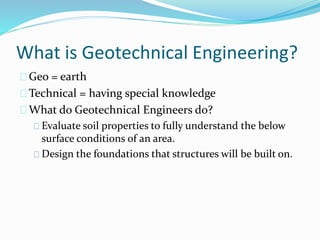Our Geotheta Diaries
Our Geotheta Diaries
Blog Article
An Unbiased View of Geotheta
Table of ContentsHow Geotheta can Save You Time, Stress, and Money.A Biased View of GeothetaThe 9-Minute Rule for GeothetaFascination About GeothetaFascination About Geotheta

They perform site examinations, collect examples, perform research laboratory tests, and examine data to examine the suitability of the ground for construction projects - Engineer of Record. Based on their searchings for, geotechnical designers give referrals for foundation layout, incline stability, retaining frameworks, and reduction of geotechnical hazards. They work together with other professionals, such as designers, architectural designers, and construction groups, to make sure that geotechnical considerations are integrated into the general job layout and implementation
By analyzing the habits and residential properties of dirt and rock, they can determine prospective geotechnical dangers such as landslides, dirt negotiation, or incline instability. Their knowledge helps avoid failings or accidents that can jeopardize lives and residential property. Right here are some comprehensive responsibilities and duties of a geotechnical designer: Website Examination: Geotechnical engineers conduct website investigations to collect data on subsurface problems.
They analyze the data to comprehend the residential or commercial properties and actions of the dirt and rock, including their toughness, leaks in the structure, compaction features, and groundwater conditions. Geotechnical Analysis and Design: Geotechnical engineers assess the information accumulated during site investigations to evaluate the security and suitability of the site for construction tasks. They carry out geotechnical calculations and modeling to evaluate aspects such as birthing capacity, negotiation, incline security, lateral earth stress, and groundwater flow.
The Ultimate Guide To Geotheta
Foundation Design: Geotechnical engineers play a vital function in developing structures that can safely support the intended framework. They examine the soil problems and load needs to identify the ideal structure kind, such as superficial foundations (e.g., grounds), deep foundations (e.g (http://peterjackson.mee.nu/where_i_work#c2299)., piles), or specialized strategies like dirt enhancement. They consider variables such as negotiation limits, birthing capability, and soil-structure interaction to create ideal foundation styles
They examine building and construction strategies, display website tasks, and carry out area evaluations to verify that the layout suggestions are followed. If unanticipated geotechnical issues arise, they examine the situation and give suggestions for remediation or modifications to the layout. Risk Assessment and Mitigation: Geotechnical engineers analyze geotechnical hazards and dangers related to the job website, such as landslides, liquefaction, or dirt erosion.

Cooperation and Communication: Geotechnical engineers function closely with various other professionals entailed in a job, such as engineers, structural designers, and building and construction groups. Effective communication and collaboration are necessary to integrate geotechnical factors to consider right into the overall task style and construction process. Geotechnical engineers give technical know-how, solution inquiries, and make certain that geotechnical needs are satisfied.
The smart Trick of Geotheta That Nobody is Talking About
Here are some kinds of geotechnical designers: Structure Engineer: Foundation engineers focus on creating and assessing structures for frameworks. They evaluate the soil conditions, load needs, and website features to figure out one of the most appropriate foundation type and design, such as shallow foundations, deep foundations, or specialized strategies like pile structures.
They review the variables affecting incline security, such as soil residential or commercial properties, groundwater conditions, and incline geometry, and create approaches to stop incline failings and alleviate dangers. Earthquake Engineer: Quake designers concentrate on assessing and making frameworks to hold up against seismic pressures. They examine the seismic danger of a site, assess soil liquefaction possibility, and establish seismic layout requirements to guarantee the safety and durability of frameworks throughout earthquakes.
They do field testing, collect examples, and examine the gathered information to define the soil residential or commercial properties, geologic developments, and groundwater problems at a site. Geotechnical Instrumentation Designer: Geotechnical instrumentation engineers concentrate on surveillance and gauging the habits more info here of soil, rock, and structures. They mount and maintain instrumentation systems that keep an eye on elements such as dirt settlement, groundwater levels, incline movements, and architectural displacements to analyze performance and give early cautions of prospective issues.
The Best Guide To Geotheta
They conduct tests such as triaxial examinations, debt consolidation tests, direct shear examinations, and leaks in the structure tests to collect information for geotechnical evaluation and layout. Geosynthetics Designer: Geosynthetics designers specialize in the style and application of geosynthetic materials, such as geotextiles, geogrids, and geomembranes. They make use of these products to boost soil security, enhance slopes, supply drainage services, and control erosion.
They often tend to be investigatory people, which indicates they're intellectual, reflective, and curious. They are curious, methodical, logical, analytical, and logical. Some of them are likewise social, implying they're kind, generous, participating, person, caring, useful, understanding, skillful, and friendly - Tailings Engineer.
In the office setting, geotechnical engineers utilize specialized software program devices to do estimations, develop layouts, and examine information. They prepare records, testimonial task specs, interact with clients and team members, and coordinate job activities. The workplace setting gives a helpful atmosphere for research, analysis, and cooperation with other professionals associated with the project.
Little Known Questions About Geotheta.
They regularly see task sites to conduct site investigations, examine geotechnical problems, and gather information for evaluation. These gos to include taking a trip to various locations, occasionally in remote or challenging surfaces. Geotechnical designers may carry out soil tasting, conduct tests, and monitor construction tasks to ensure that the geotechnical elements of the project are being applied appropriately.
Geotechnical engineers also work in specialized geotechnical labs. Geotechnical laboratory designers function thoroughly in these settings, handling screening tools, running tools, and videotaping information.
Report this page